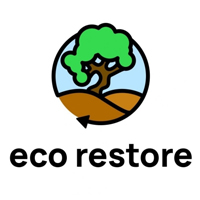Modernising old practices

EcoRestore is an innovative Ghanaian company that modernises old practices to implement sustainable landscape management.
West Africa has seen a significant loss of forest cover in recent decades. Land use change, mechanisation of agriculture, use of chemicals, mining and logging, loss of fallow land and expansion of urban areas have a considerable impact on landscape ecology! This reduces soil fertility and crop resilience, putting food security at risk. Together with the loss of biodiversity and ecosystem services, the loss of vegetation cover is a major problem facing local communities in northern Ghana and elsewhere.
EcoRestore therefore proposes to combine scientific and ancestral knowledge to restore local vegetation cover and provide solutions based on trees and their ecosystem services to promote an innovative, sustainable and nature-friendly agricultural sector.
A first project in north-eastern Ghana
 This partnership begins with the implementation of a project to protect and restore the ecological and cultural heritage of the Bimoba and Moba peoples in northeastern Ghana with funding from Ciel d'Azur Labs. This area is identified as a wildlife corridor with ancestral traditions, more or less active, participating in the preservation of biodiversity.
This partnership begins with the implementation of a project to protect and restore the ecological and cultural heritage of the Bimoba and Moba peoples in northeastern Ghana with funding from Ciel d'Azur Labs. This area is identified as a wildlife corridor with ancestral traditions, more or less active, participating in the preservation of biodiversity. In 2022, the main objectives of the project will be :
- Protect riparian areas, to reduce the risk of erosion and therefore flooding;
- Identify and rehabilitate sacred forest areas to protect cultural heritage;
- Diversify sources of income by promoting agroforestry on farms, regenerating shea parks and developing sustainable firewood production on degraded hills. The planting of fast-growing tree species and firewood will bring additional income to the community in the short term, while the regeneration of shea parks and the planting of economic trees on farms (production of fruit, dyes, timber, etc.) will ensure income diversification in the long term.
These actions should help to conserve natural areas but also promote greater resilience of ecosystems and the populations that depend on them in the face of climate change.



